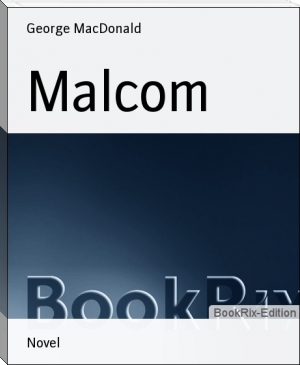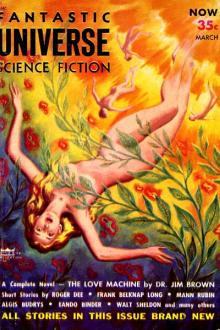Malcom by George MacDonald (e books for reading .txt) 📖

- Author: George MacDonald
Book online «Malcom by George MacDonald (e books for reading .txt) 📖». Author George MacDonald
"Ye maunna gang yet, my lord," said Malcolm. "They maun be a' oot first."
"I don't care who sees me," protested the weary man.
"But yer lordship wadna like to be descriet scram'lin' doon efter the back like the bear in Robinson Crusoe!"
The marquis grumbled, and yielded impatiently.
At length Malcolm, concluding from the silence that the meeting had thoroughly skailed, peeped cautiously out to make sure. But after a moment, he drew back, saying in a regretful whisper,
"I 'm sorry ye canna gang yet, my lord. There's some half a dizzen o' ill luikin' chields, cairds (gipsies), I 'm thinkin', or maybe waur, congregat doon there, an' it 's my opinion they're efter nae guid, my lord."
"How do you know that?"
"Ony body wad ken that, 'at got a glimp o' them."
"Let me look."
"Na, my lord; ye dinna understan' the lie o' the stanes eneuch to haud oot o' sicht."
"How long do you mean to keep us here?" asked the marquis impatiently.
"Till it's safe to gang, my lord. For onything I ken, they may be efter comin' up here. They may be used to the place-though I dinna think it."
"In that case we must go down at once. We must not let them find us here."
"They wad tak 's ane by ane as we gaed doon, my lord, an' we wadna hae a chance. Think o' my leddy there!"
Florimel heard all, but with the courage of her race.
"This is a fine position you have brought us into, MacPhail!" said his master, now thoroughly uneasy for his daughter's sake.
"Nae waur nor I 'll tak ye oot o', gien ye lippen to me, my lord, an' no speyk a word."
"If you tell them who papa is," said Florimel, "they won't do us any harm, surely!"
"I 'm nane sae sure o' that. They micht want to ripe 's pooches (search his pockets), an' my lord wad ill stan' that, I 'm thinkin'! Na, na. Jist stan' ye back, my lord an' my leddy, an' dinna speyk a word. I s' sattle them. They're sic villains, there nae terms to be hauden wi' them."
His lordship was far from satisfied; but a light shining up into the crevice at the moment, gave powerful support to Malcolm's authority: he took Florimel's hand and drew her a little farther from the mouth of the cave.
"Don't you wish we had Demon with us?" whispered the girl.
"I was thinking how I never went without a dagger in Venice," said the marquis, "and never once had occasion to use it. Now I haven't even a penknife about me! It looks very awkward."
"Please don't talk like that," said Florimel. "Can't you trust Malcolm, papa?"
"Oh, yes; perfectly!" he answered; but the tone was hardly up to the words.
They could see the dim figure of Malcolm, outlined in fits of the approaching light, all but filling the narrow entrance, as he bent forward to listen. Presently he laid himself down, leaning on his left elbow, with his right shoulder only a little above the level of the passage. The light came nearer, and they heard the sound of scrambling on the rock, but no voice; then for one moment the light shone clear upon the roof of the cleft; the next, came the sound of a dull blow, the light vanished, and the noise of a heavy fall came from beneath.
"Ane o' them, my lord," said Malcolm, in a sharp whisper, over his shoulder.
A confusion of voices arose.
"You booby!" said one. "You climb like a calf. I'll go next."
Evidently they thought he had slipped and fallen, and he was unable to set them right. Malcolm heard them drag him out of the way.
The second ascended more rapidly, and met his fate the sooner. As he delivered the blow, Malcolm recognized one of the laird's assailants, and was now perfectly at his ease.
"Twa o' them, my lord," he said. "Gien we had ane mair doon, we cud manage the lave."
The second, however, had not lost his speech, and amidst the confused talk that followed, Malcolm heard the words: "Rin doon to the coble for the gun," and, immediately after, the sound of feet hurrying from the cave. He rose quietly, leaped into the midst of them, came down upon one, and struck out right and left. Two ran, and three lay where they were.
"Gien ane o' ye muv han' or fit, I'll brain him wi' 's ain stick," he cried, as he wrenched a cudgel from the grasp of one of them. Then catching up a lantern, and hurrying behind the projecting rock -"Haste ye, an' come," he shouted. "The w'y 's clear, but only for a meenute."
Florimel appeared, and Malcolm got her down.
"Mind that fellow," cried the marquis from above.
Malcolm turned quickly, and saw the gleam of a knife in the grasp of his old enemy, who had risen, and crept behind him to the recess. He flung the lantern in his face, following it with a blow in which were concentrated all the weight and energy of his frame. The man went down again heavily, and Malcolm instantly trampled all their lanterns to pieces.
"Noo," he said to himself, "they winna ken but it 's the laird an' Phemy wi' me!"
Then turning, and taking Florimel by the arm, he hurried her out of the cave, followed by the marquis.
They emerged in the liquid darkness of a starry night. Lady Florimel clung to both her father and Malcolm. It was a rough way for some little distance, but at length they reached the hard wet sand, and the marquis would have stopped to take breath; but Malcolm was uneasy, and hurried them on.
"What are you frightened at now?" asked his lordship.
"Naething," answered Malcolm, adding to himself however, "I 'm fleyt at naethin'-I 'm fleyt for the laird."
As they approached the tunnel, he fell behind.
"Why don't you come on?" said his lordship.
"I 'm gaein' back noo 'at ye 're safe," said Malcolm.
"Going back! What for?" asked the marquis.
"I maun see what thae villains are up till," answered Malcolm.
"Not alone, surely!" exclaimed the marquis. "At least get some of your people to go with you."
"There 's nae time, my lord. Dinna be fleyt for me: I s' tak care o' mysel'."
He was already yards away, running at full speed. The marquis shouted after him, but Malcolm would not hear.
When he reached the Baillies' Barn once more, all was still. He groped his way in and found his own lantern where they had been sitting, and having lighted it, descended and followed the windings of the cavern a long way, but saw nothing of the laird or Phemy. Coming at length to a spot where he heard the rushing of a stream, he found he could go no farther: the roof of the cave had fallen, and blocked up the way with huge masses of stone and earth. He had come a good distance certainly, but by no means so far as Phemy's imagination had represented the reach of the cavern. He might however have missed a turn, he thought.
The sound he heard was that of the Lossie Burn, flowing along in the starlight through the grounds of the House. Of this he satisfied himself afterwards; and then it seemed to him not unlikely that in ancient times the river had found its way to the sea along the cave, for throughout its length the action of water was plainly visible. But perhaps the sea itself had used to go roaring along the great duct: Malcolm was no geologist, and could not tell.
CHAPTER XLVII: MRS STEWART'S CLAIM
The weather became unsettled with the approach of winter, and the marquis had a boat house built at the west end of the Seaton: there the little cutter was laid up, well wrapt in tarpaulins, like a butterfly returned to the golden coffin of her internatal chrysalis. A great part of his resulting leisure, Malcolm spent with Mr Graham, to whom he had, as a matter of course, unfolded the trouble caused him by Duncan's communication.
The more thoughtful a man is, and the more conscious of what is going on within himself, the more interest will he take in what he can know of his progenitors, to the remotest generations; and a regard to ancestral honours, however contemptible the forms which the appropriation of them often assumes, is a plant rooted in the deepest soil of humanity. The high souled labourer will yield to none in his respect for the dignity of his origin, and Malcolm had been as proud of the humble descent he supposed his own, as Lord Lossie was of his mighty ancestry. Malcolm had indeed a loftier sense of resulting dignity than his master.
He reverenced Duncan both for his uprightness and for a certain grandeur of spirit, which, however ridiculous to the common eye, would have been glorious in the eyes of the chivalry of old; he looked up to him with admiration because of his gifts in poetry and music; and loved him endlessly for his unfailing goodness and tenderness to himself. Even the hatred of the grand old man had an element of unselfishness in its retroaction, of power in its persistency, and of greatness in its absolute contempt of compromise. At the same time he was the only human being to whom Malcolm's heart had gone forth as to his own; and now, with the knowledge of yet deeper cause for loving him, he had to part with the sense of a filial relation to him! And this involved more; for
 Have you ever thought about what fiction is? Probably, such a question may seem surprising: and so everything is clear. Every person throughout his life has to repeatedly create the works he needs for specific purposes - statements, autobiographies, dictations - using not gypsum or clay, not musical notes, not paints, but just a word. At the same time, almost every person will be very surprised if he is told that he thereby created a work of fiction, which is very different from visual art, music and sculpture making. However, everyone understands that a student's essay or dictation is fundamentally different from novels, short stories, news that are created by professional writers. In the works of professionals there is the most important difference - excogitation. But, oddly enough, in a school literature course, you don’t realize the full power of fiction. So using our website in your free time discover fiction for yourself.
Have you ever thought about what fiction is? Probably, such a question may seem surprising: and so everything is clear. Every person throughout his life has to repeatedly create the works he needs for specific purposes - statements, autobiographies, dictations - using not gypsum or clay, not musical notes, not paints, but just a word. At the same time, almost every person will be very surprised if he is told that he thereby created a work of fiction, which is very different from visual art, music and sculpture making. However, everyone understands that a student's essay or dictation is fundamentally different from novels, short stories, news that are created by professional writers. In the works of professionals there is the most important difference - excogitation. But, oddly enough, in a school literature course, you don’t realize the full power of fiction. So using our website in your free time discover fiction for yourself. 




Comments (0)